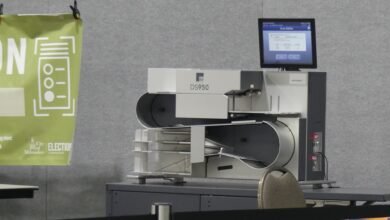AI task force issues action plan, holds final meeting

The Governor’s Task Force on Workforce and Artificial Intelligence has issued its final action plan, covering a wide array of policy proposals across education, government, workforce and economic development.
The task force held its final meeting at Madison College this week, wrapping up efforts that began with its first meeting in October 2023. Department of Workforce Development Secretary Amy Pechacek said its recommendations will be used in preparing the next biennial state budget.
“In addition to the governor’s budget, ideas for specific investments and policy proposals may move forward via requests from individual agencies as well,” she said.
Within the education section of the report, the task force is recommending: new investments in AI research at the Universities of Wisconsin; integrating AI into curriculum development; supporting faculty recruitment and retention in AI fields at UW schools and in the Wisconsin Technical College System; offering new “stackable” credentials in AI that build on prior learning, and more.
UW President Jay Rothman said the state’s higher education institutions are committed to preparing students for jobs and roles that don’t yet exist, telling the task force “our willingness to adapt strategically to what the future may bring” will be crucial.
“These AI technologies might include automated processes or chatbots designed to act as virtual academic advisors, a system to notify automatically and prompt students to complete an assignment or to seek additional help,” Rothman said, adding “we are not far off from the day that tutoring will be available through AI.”
The task force recommends efforts to modernize state government infrastructure with AI, as well as considering its deployment for energy management, traffic control and wastewater treatment. It also suggests the creation of a unit within the Department of Administration to create an “enterprise-wide data governance framework” to ensure proper use of data, particularly in AI applications.
On the workforce development side, recommendations include: expanding apprenticeship programs to incorporate AI; providing training to workers displaced by AI adoption; funding employer-led AI training programs for their workers; creating an AI “layoff aversion program” and an AI workforce talent pipeline; launching a digital literacy campaign and more.
Economic development policy proposals in the report include offering help to small businesses looking to use AI, creating “AI Innovation Hubs” for startups using the technology in manufacturing and agriculture, and holding forums to lay out an “AI roadmap” for companies in the state.
Source link



